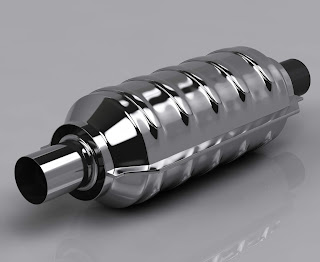Your Charlotte Toyota vehicle is truly an engineering marvel
with all of its moving parts and mechanisms all at work in perfect sync. A
part of your car that may seem as simple as two tail pipes, your exhaust system,
is actually far more complex. In fact, your car’s exhaust system works to
remove pollution from your exhaust gas, making it less toxic before it’s
released from your tail pipe(s). A critical component of this intricate engine
part, the catalytic converter, is an important one to know so you can understand
how it works and how to troubleshoot one. At Toyota of North Charlotte, we’re
here to tell you all you need to know about the catalytic converter, so you can
be one step closer to becoming an auto service expert.
How does a catalytic converter work?
Your exhaust system actively works to remove pollutants from
engine gas created from combustion and it uses the catalytic converter to do it.
This Charlotte Toyota engine part uses a process called catalyzing that uses a
redox reaction. There’s a lot of science behind this one, but we’ll keep it short
and sweet. Essentially, the catalytic converter catalyzes exhaust gas to produce
a cleaner combustion byproduct. This engine part is also responsible for
essential functions like:
- Keeping accelerations smooth.
- Preventing excessive gas from building up in the engine.
- Maximizing your vehicle’s fuel efficiency.
Making sure start-ups are smooth.
Typically, during the lifetime of your Charlotte Toyota car,
your catalytic converter will not likely have to be replaced or be maintained,
but that doesn’t mean you should turn a blind eye to this essential vehicle part.
Troubleshooting your Charlotte Toyota vehicle
It may be uncommon for this Charlotte Toyota engine part to
become damaged, but that doesn’t mean it doesn’t happen from time to time. A
typical issue that can arise with catalytic converter is catalyst poisoning.
This can happen when lead and sulfur leak into the converter and cause poor combustion.
This can lead to clogging and eventually the converter will stop working. This
Charlotte Toyota engine may be undergoing damage if you experience any of these
symptoms:
- Your check engine light turns on.
- Your vehicle may experience failed or delayed start-ups.
- Your vehicle could fail emission tests.
- Acceleration could be delayed or nonexistent.
- Your fuel efficiency drops quickly.
Fixing and maintaining your vehicle’s catalytic converter is
as easy as getting an oil change. In fact, it’s just that easy! Making sure
your Charlotte Toyota vehicle is up-to-date on routine maintenance is key to keeping
this vehicle part healthy. It’s also suggested to have your fluid levels
periodically checked along with the fuel injectors.
If you think your converter might be in rough shape or you
need to get your vehicle on a more routine auto service schedule, then come
visit Toyota of North Charlotte today! Our expert auto service techs can get
your ride back on the road in no time and at an affordable price. Give us a call
at (704) 659 – 2025 today!

No comments:
Post a Comment